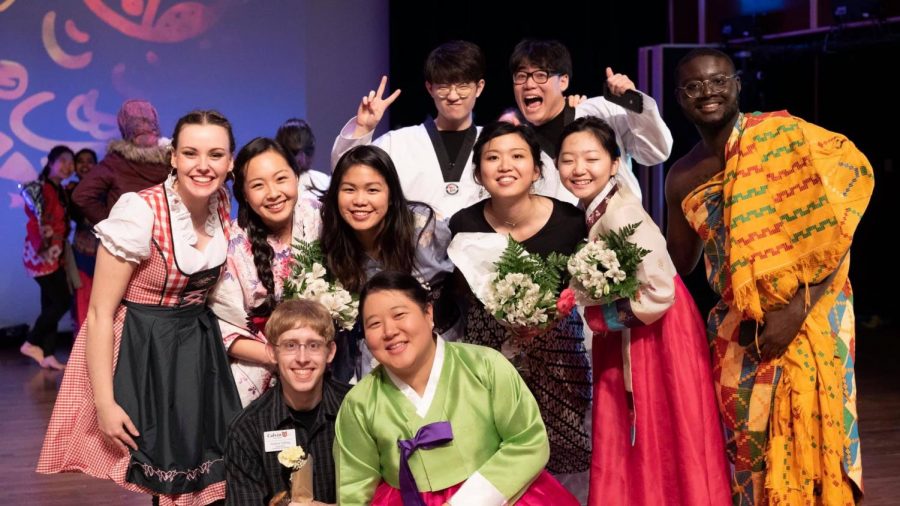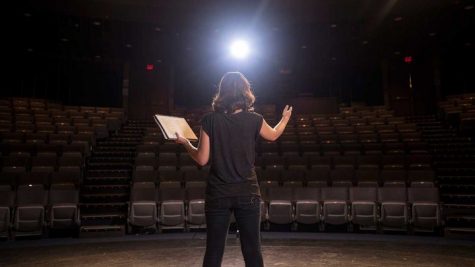Rangeela 2019: “The Story We Tell” shows pride for origins
Photo courtesy of Calvin Rangeela Facebook page.
Stories that move you, paired with people onstage who move about in flashes of color and pride: that was Rangeela 2019, themed “The Story We Tell.” The two-night, annually sold-out cultural show, named for the Hindi word for “colorful,” took place Feb. 22 and 23. This year, Rangeela had 350-plus participants — the largest number since it began in 1993.
First was the fashion show: a sampling of fanciful costumes from around the world, centered around a wedding couple in Ethiopian dress and their many guests, with their respective traditions explained in slides. This was a change from previous years, where the fashion was usually displayed close to intermission time.
“We thought it would be right to start the show with a celebration that many of us are familiar with — a wedding which unites cultures from all over,” said Josephine Loh, co-director for Rangeela.
Spectator and senior Hae In Kim said of the show, “As soon as the first act started, tears were streaming down my face. I was overwhelmed with emotion and appreciation toward the blood, sweat and tears of all my friends who were involved.”
Acts showcasing Italy, Polynesia and Mexico were new to the Rangeela stage this year, with Italy showing off a vibrant “Tarantella” dance, Polynesia featuring choreography to Lilo & Stitch’s “He Mele No Lilo” as well as the New Zealand “haka,” and Mexico their “La Bruja” dance.
“Tonight, [the Mexico act] would like to tell you that their ancestors did not cross the border. The border crossed them,” said master of ceremonies (MC) Mayva Anyango, a first-year student, to loud cheers in the crowd.
Mexico is one of two Latin American countries represented in this year’s Rangeela, the other being Costa Rica.
Acts are decided based on student leaders’ proposals and the committee’s vision for the year’s show. The Middle East act, which made its debut last year, did not return this year.
The China act gave a spotlight to four minority groups currently living in China: the Mongols, Uyghurs, Dai and Tibetans. MC Kashyap Sigdel, a senior, highlighted in particular the plight of the Uyghurs in China, explaining that they face significant persecution because of their Muslim faith.
“Since much of the world does not know about their situation, we wanted Rangeela to be the platform to show our love and support for the Uyghur people,” said Sigdel.
Dianne Cayetano, a senior and one of the leaders for the Philippines act, shared in an interview with Chimes how the story in her act was personal to her and to many families in her home country. In the act, a mother leaves her son to go work abroad as a domestic helper, so that she can support her family with the higher income she would make overseas. Cayetano’s mother had worked as a domestic helper in Beijing, despite being highly respected as a teacher in the Philippines.
“There were times where she would call us, and my aunts kept telling her to go back home because they would mistreat her… she missed us so much and said she just wanted to hug us,” said Cayetano.
Cayetano also mentioned the joys and struggles of getting to know the various people participating in the Philippines act. One was a Filipino adoptee raised by a white family in the US. Another was a Filipino who grew up in Canada identifying as white. She embraced Filipino culture for the first time in her life at Calvin, even adding that she had picked up on a Filipino accent along the way of Rangeela practices.
The latter, who asked not to be named, shared that she had grown up in areas that were not diverse and sometimes resented how she looked different from others. She thought she would carry this with her at Calvin, but Rangeela gave her opportunities to form friendships with a culturally diverse community and feel proud of her ethnicity.
“I’m so thankful I joined [the Philippines act] because not only did I learn more about Filipino culture, I was able to feel more connected with my Filipino roots. I’m so glad I now have a Filipino family here at Calvin,” she said.
MC Anyango introduced the Ghana act as showing “the pride of being the first African country to gain independence,” and the yells of excitement grew louder as audience members cheered for friends on the stage.
The Ghana act included an enactment of the trans-Atlantic slave trade which began 400 years ago, with gut-wrenching cries amid the slow, bent movements. But the act concluded with hopeful commemoration: in modern-day Ghana, 2019 has been dubbed the “year of return,” announced junior Lisa Owusu from the stage just before celebratory dancing with electronic beats broke out. Other acts, such as those of Japan and Korea, combined traditional elements with more modern moves and music.
Despite the flamboyant array of cultural costumes dancing their way across the stage, the Rangeela MCs acknowledged that even those whose backgrounds aren’t so colorful still have a story to tell.
“The thing is, Zimbabweans don’t have traditional dress. My people went straight from animal skin pre-civilization to wearing these clothes,” joked MC Nyarie Sirewu, a senior, showing off her H&M slick black suit with gold diamond patterns.
Sophomore Thao Tran, who was among the audience, expressed appreciation for how the Calvin community creates space for diversity through Rangeela.
“Even though I do not belong to these cultures, I feel a sense of belonging watching them on the stage,” said Tran.
Rangeela 2019 was a glimpse into the diversity that exists around our world, even in the microcosm that is Calvin College. Through stories ranging from the bitter to the sweet, the CFAC auditorium stage had much to offer for contemplation, admiration and celebration.
“All of us here at Calvin have a story filled with traditions, values and roots we forget to go back to sometimes. In turn, we all have much to learn,” said Loh.
“The goal… is not to stereotype others, but to shed some light on people’s stories,” MC Sirewu said. “Let’s have hearts that yearn for unity within humanity.”







